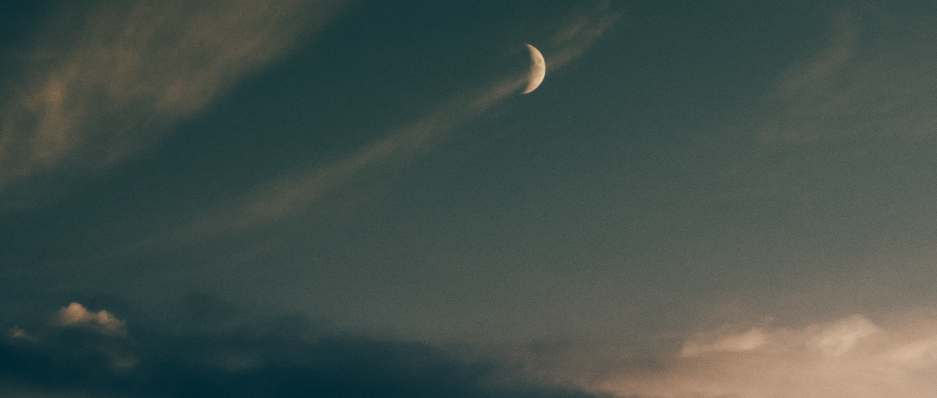
Prompt Images
I was closer to the stars than I had ever been before.
It was 10:00 P.M. local time, but my body was sluggishly set to 1:00 in the morning. The plane was dark and quiet, nearing the end of its late-night trip across the country. Because of the pandemic, my bank of seats was empty; I could focus on the sights outside while my relatively distant fellow travelers faded into mute obscurity, their faces masked by cloth and cotton with no more personality than extras in a grotesque parody of a masquerade ball.
Anonymity of human purpose was an unexpected boon, here in the silent sky. Did they, too, have a sudden death in the family, pushing them to fly—out of necessity—at a time beset by doubt and potential danger? It didn’t matter. Without proximity, my mind was free from having to dwell on their circumstances as we soared above the earth.
Outside my plexiglass window the moon was half-full, and from above the clouds, the sky was clear and vast. I saw the stars as I imagined our ancestors might have, without a haze of light or pollution to shroud them from view. But unlike them, I identified the lights in the sky with an app: Scorpio hung next to the moon, with Jupiter and Saturn nearby while the wolf Lupus prowled underneath.
I had turned to the stars outside my window for comfort and discovery, the thrill of chasing down mythological shapes in the sky. But their quiet presence prompted ever more questions. What happens when we die? Why do we have to do it?
And, knowing that it will all end, what does it mean to live?
My mind wended down a path our ancient cousins surely had as well, technology and time notwithstanding. I could gaze at the stars for hours. They would never tell me more than they were now. My questions, so uniquely human in nature, did not have ready answers. Some might say, perhaps, my singular job in life was to find or make my own. But as of now, as I stared out at the heavens, the unknown simply stared quietly back at me.
Thank God circumstances had permitted us to gather, distanced, in a reasonable approximation of the rituals of grief. My heart breaks to think of those suffering right now from the greatest of losses without the comfort of human presence. Even if I would not—could not—hug them, my family was at least apart-together for the funeral and the gathering at the grave.
And so I flew back home, under the dark and looming sky, filled with a mixture of sadness for the finite and awe of the infinite.
Underneath us, the clouds masked a country riven by false certainties.
Faced with fear—of disease, of social change, of always moving forward in a complex, shared human world—we could have come together to accept, confront, and make peace with what we didn’t know.
Instead we had easily and loudly separated into twin camps of distrustful, incompatible truths. To mask or not to mask; to march or not to march; to sacrifice or not to sacrifice: we are so far apart, all of us. Yet as distant as we are, somehow there is no space left between for “maybe” or “what if?”
The plane had begun its descent. The stars above flickered from view as we passed beneath the clouds, replaced by the yellow and orange lights of the city. They grew larger by the minute, brighter and more numerous than the midnight eternal offerings: flares in the darkness, marking an arrogantly insistent swath of undeniable human presence on the land. Down here there was no room for quiet or humility; here, the “I don’t knows” would be shouted down with the “But you musts!”
Wrapped anew in the noise of our anger and fear, I knew only the quiet truth that we should spend more time among the stars above.


